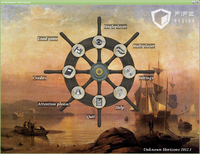Beyond the Horizon
Colonizing new territory, processing raw materials, and trading goods are ingredients for popular strategy games. This genre is served on Linux by the free Unknown Horizons project.
|

Colonizing new territory, processing raw materials, and trading goods are ingredients for popular strategy games. This genre is served on Linux by the free Unknown Horizons project.
The principles behind the Unknown Horizons game [1] are reminiscent of Ubisoft's popular free "Anno" strategy game series [2], and that's no coincidence, because Unknown Horizons is a clone of this popular series. The Anno games have been extremely popular for many years, but because the manufacturer has studiously ignored Linux, a few fans summarily started work on a clone in 2005. Now, thanks to dedicated developers, it is growing into a worthy competitor.
In the first versions of the clone, called "OpenAnno," during the game the player viewed a landscape from above and at an angle, as in the original isometric representation. Just two years later, however, the project ground to a halt. Then, in the spring of 2007, new developers took over the helm and made some drastic decisions. They tried to develop a variant with 3D graphics, in addition to the 2D version, but the developers soon realized they had underestimated the amount of time and effort involved. To simplify development as far as possible, they ditched the existing code from the 2D version and moved to the Flexible Isometric Free Engine, or FIFE for short [3]. FIFE facilitates the process of programming games with isometric graphics. However, shortly after this decision, lack of time again brought the project to a standstill.
Fortunately, not much time passed before a couple of new enthusiasts adopted the project, and they have managed to sustain development to the present day. The clone project is headed by two project managers with separate responsibilities and it has adopted English as its main language. What was originally a purely German-language project has gained supporters from all over the world. Previously, one non-German speaker from India had helped translate the documentation and discussions with the aid of Google Translate.
[...]
Pages: 4
Linux systems are well suited for use as a robust platform for computing work and software development. When it comes to gaming, however, most people prefer Windows. Current 3D games with and without Steam support show that this is no longer the case.
The appearance of new game engines with Linux support gives rise to hope that more games will start to appear in Linux versions. The free game engines are also getting better.
On the last day of the year part four of the gamers recommendations offer some adventure games, sports and action. Have fun!
More games for Linux and open source - a large choice for every taste. Strategy, chess, and more.To be continued.
Although distribution systems such as Steam are poised to attract more game developers to Linux, some commercial games are already only available from Software Center. We browsed through the offerings to present you with the eight most interesting and recommended ones.
© 2025 Linux New Media USA, LLC – Legal Notice